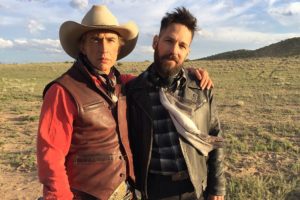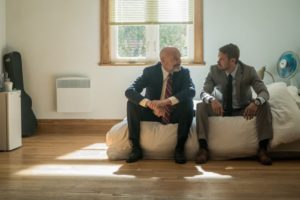[Published at Slash Film] Comedy icon Will Forte received his first few breaks in Hollywood as a writer more than 20 years ago. The scribe soon discovered that he was equally adept as an actor, becoming an instant star in the public eye on Saturday Night Live (SNL), to which he graduated from the legendary Groundlings Theatre & School in Los Angeles. The rest, as the saying goes, is history. Forte would dominate the comedy scene in the 2000s and 2010s, acting in noteworthy features such as Beerfest, Fanboys, MacGruber, The Lego Movie, 7 Days in Hell, A Futile and Stupid Gesture, Booksmart, and Goodboys, appearing in hit TV shows including How I Met Your Mother, Parks and Recreation, 30 Rock, The Cleveland Show, American Dad, The League, The Last Man on Earth, and I Think You Should Leave with Tim Robinson, and frequently collaborating with improv-friendly peers like Andy Samberg and The Lonely Island, Broken Lizard comedy troupe, and Tim and Eric. Forte even flexed his dramatic range, starring in auteur Alexander Payne’s acclaimed film, Nebraska.
As an actor, Forte benefits from his adroitness as a writer. And vice-versa. Both crafts come naturally to him, and both crafts work harmoniously with one another. When reading a script, Forte can more readily deconstruct it and discern whether or not the material works for him. When writing a script (The Brothers Solomon, MacGruber, and The Last Man on Earth are examples of works that Forte has either created, written, or co-written), Forte is finely attuned to the performer, creating scenarios that work for every actor, taking into consideration each person’s various, distinct skillsets, a quality that he undoubtedly picked up writing sketches for himself and his peers while he was at the Groundlings. For Forte’s latest film, Extra Ordinary, the comedic actor was intuitively taken with filmmakers’ Mike Ahern and Enda Loughman’s collective vision from day one.
In Extra Ordinary, Forte plays Christian, a washed-up rock star who uses a young woman in a Satanic ritual in order to regain the fame he once had. His delightfully over-the-top performance balances out the pleasant mundanity of the film’s other characters.
Ahead of Extra Ordinary’s theatrical release, I had a chance to sit down with Forte to chat about the film, his love for Ireland, his start at the Groundlings, his favorite SNL sketch in which he performed, his experience filming Nebraska, the upcoming MacGruber TV series, and more.
As an actor and a writer, what intrigued you about Mike Ahern and Enda Loughman’s script?
When I was first approached about this movie, they sent over the script, and they also had done this tiny, little video, which is basically what you see at the very beginning of the movie. It looks like an ’80s video tape by the spiritual TV guy. So they sent that two-minute short, and within ten seconds, they’re talking about all the different things in life that you might not know are haunted, but are haunted. And they said, “A wheeled bin.” And then the next one was, “A gravel.” And they showed this little piece of gravel hopping along the road, and it was so stupid. I just said, “Oh, I have to do this movie.” It was pretty quick. And then I read the rest of the script, and it was just filled with all these little subtleties; it was big and over the top, but also really tiny at the same time. A lot of fun, little things. And when I found out that they had written the script and were going to be the directors, I knew that those little nuances that I loved about the script were things that they would know exactly how to capture.
They had the entire vision in their minds beforehand.
It just seemed very Irish, if that makes sense. There was something really fun, and quirky, and just a little off from the things I’m used to reading. And it was pretty delightful.
Speaking of Ireland, Extra Ordinary at once pokes fun at while also paying homage to Irish folklore and the eccentric people who still believe in some of these tall tales. Did you have a chance to research any of the country’s legends?
I did not really do a lot of research into that stuff. But I had been to Ireland several times. When I went there for Extra Ordinary, I basically got in on a Sunday ,we did hair and makeup on Monday, and then I started working on Tuesday. So I didn’t have time to travel around. But I did get to work on something about six or seven years ago called Run & Jump, and fell in love with Ireland during that experience. I’ve been back to Ireland several times since that experience. I just feel such a deep connection to Ireland and I love it, so I try to go out there on my free time as much as possible. So a lot of that stuff makes sense to my brain after spending so much time with the people of Ireland and my different friends who are from Ireland.
Can you do a good Irish accent after spending a decent amount of time there?
I do the worst Irish accent [laughing]. When I was [doing] Run & Jump, it was predominantly Irish. Same with Extra Ordinary. And so I would try to, as a joke, do an Irish accent for them while we were doing hair and makeup in the mornings and stuff. And my Irish accent was just pretty much the Lucky Charms guy, which they would hate. They just said it was so horrible. And then the movie made it into the Galway Film Festival [Fleadh], and that year the president of Ireland was the keynote speaker at the awards ceremony at the very end. And the accent that I do is his accent. So it was such a wonderful, magical moment where I had for years thought that I did this incredibly over-the-top Irish accent, but it is very close to President Higgins’. It’s not a dead-on impression of him, by any means, but it’s in the ballpark of how he speaks. The way he speaks sounds beautiful. Mine still sounds pretty stupid.
But, nonetheless, pretty validating.
Yeah, it was validating.
Your character is influenced by an amalgam of celebrities who moved to Ireland in the ’80s to evade their taxes. Was there a conversation with Mike and Enda about any specific people on whom you should base your character, Christian?
The person that would always come up was Chris de Burgh. That was the person they kept mentioning. So I looked at footage of him. But all the stuff was really on the page in the script, so I don’t remember too much discussion about how to play the character. It felt like they wrote it, at least the Christian Winter part, as this over-the-top character [laughing].
The ghosts in this film are lonely and stuck in their own existences. It’s a very nice parallel for the characters of Rose and Martin before they find one another. But I can’t say that there’s an equally nice parallel for Christian and Claudia O’Doherty’s character, Claudia. She’s so great in this as well.
She’s fantastic. I had never met her before. And so it was really delightful to get to have this experience with her because we’re in all the same scenes and our days off were the same days. So we would go just hang around and get to know each other. She’s so, so funny and such a delightful person.
Who’s the mastermind between Christian and Claudia?
I feel like she is [laughing]. Definitely. She wears the pants in the family, for sure.
You got your start at the Groundlings, where many notable comedians and comedic actors begin their careers. What have you taken from that improv style of acting that you still regularly use in your everyday work today?
Wow. Definitely when you go up on a line and you can’t remember; not having any lines in improv, you just figure out a way to continue acting without words. There are a million little things. There’s something very liberating about getting up onstage, not knowing at all what you’re going to say. Terrifying at the same time. I was not the greatest improviser. I never conquered the fear part of it in the way that other people did. So, thank god, for me, if there was no written component to the Groundlings, I don’t know that I would’ve made it to the stage level. I was a better sketch writer than an improviser, so I would clunk my way through the improvs and, hopefully, win back the audience with written stuff. But still, it’s very valuable experience for actors and just people doing anything. If you’re a stock broker, you should take some improv classes. Everybody.
I took a class in the past, and there were people in so many different industries who were taking it in order to benefit from what it had to offer, in some capacity or another.
It really teaches you to connect and communicate with people.
Was there anyone in your Groundlings class that you ended up working with later on in your career?
Oh, yeah. Maya Rudolph, Cheryl Hines, Jim Rash, Nat Faxon, Oscar Nunez, Chris Parnell was right around there. I’m sure I’m forgetting a bunch of people…Kind of fun to look back now because it seems like the people [of the] Groundlings system, at that time, going through it, all had good, successful careers. And I’m not even counting the people that I saw when I first decided, “Oh, I’ve heard about the Groundlings. I want to go check it out.” I went to a show. And the show that I saw was Will Ferrell, Chris Kattan, Cheri Oteri, and Ana Gasteyer. Then, a couple months later, Will Ferrell went to Saturday Night Live. So I never got a chance to perform with him at the Groundlings. That’s the level of comedy that you’re seeing is those people who are now comedy gods; but back then they were just on this 99-seat theater stage. You knew, “Oh, this place is the right place to go.”
“This place is something special.”
It’s a little daunting, though, too. Because you’re like, “Oh my god, these people are funny.”
You’ve had more than a few memorable SNL sketches; “Fly High Duluth,” “The Falconer,” “MacGruber,” “ESPN Classic (Ladies’ Long Drive Championship),” “Potato Chip,” “Clancy T. Bachleratt and Jackie Snad,” to name a few. Do you, personally, have, let’s narrow it down to a top three favorite sketches that you’ve performed?
I definitely have one single favorite. There was the one where I play a coach. I’m coaching this basketball team. Peyton Manning is the host. And we do this dumb dance. I’m trying to motivate my basketball team, who’s down by, like, 50 or 100 points [laughing]. And I play them this dumb song and I start dancing to the song. It just becomes all about this dumb dance. And there was something about that. A lot of times, what’ll happen is you’ll do a sketch and you’ll be working on it throughout the week. Sometimes, you’ll forget what it was that you found funny about the sketch. Sometimes, the best version of the sketch will be at the dress rehearsal show and then you’ll lose it for the air show. And this was one that I always thought was pretty fun, but because I didn’t choreograph the moves, it was just going out there and winging it.
It hadn’t really worked. Even during the dress rehearsal, I remember the notes that Lorne [Michaels] gave before the live show – I thought he was maybe going to cut it – and he said, “Maybe you can shorten the dance.” And then when we got out there for the live show, something clicked in a way that it had not clicked in any of the previous iterations. And it was one of those rare times that it all just came together. That’ll always be the one that I look back on with the most fondness, but, god, there are a million, million things that I love doing. “Clancy T. Bachleratt, Jackie Snad” with Kristen Wiig. And all the “MacGrubers.” Just so many fun people we got to work with.
The period after which cast members leave SNL can be decisive in regards to their careers. But you jumped right into drama with Nebraska. What was that experience like, especially working with Alexander Payne and that amazing cast?
Oh, man. I still can’t believe that I got to be in that movie [laughing]. When I left SNL, MacGruber had just bombed at the box office. I certainly was not leaving because I thought that I had any kind of movie career on the horizon. It just seemed like I had been there for a long time and I wanted to be closer to my family. I had to leave at some point. When this Nebraska opportunity just came out of nowhere, I put myself on tape and sent it in. And then didn’t hear anything for six months, but just didn’t ever think that I would hear something. I just sent it in and didn’t think about it anymore. So when I heard, six months later, that Alexander Payne liked the tape and wanted to see me to audition in front of him, I was terrified. And I had almost forgotten that I had put myself on tape for it. That whole experience was just like I described improv. Terrifying. But the best experience of all time. It just came out of nowhere. I’m blown away [by] the blessing that was getting to have that special experience, work with Alexander Payne, work with Bruce Dern. And it just is something that I’ll never forget. And it feels like a million years ago, now.
Time really does fly. We could all use some more MacGruber in our lives. The next chapter began as a feature sequel, but evolved into a TV series. What went into that decision?
We were originally going to try to do a MacGruber 2. And then, somewhere along the way, we decided that maybe it would be fun to try to do it as a series. For different platforms that would be interested in doing MacGruber, it makes more sense, budget-wise, for what we’re needing to make; it makes more sense to do a limited-run series than a movie. So we just started thinking about it in terms of a series instead and figured out this fun season arc. We’re pretty excited by what we’ve come up with, but we’re just waiting to see if they’ll let us do it.
Are there any basic plot details that you could share, or are you keeping it under wraps?
It takes place about seven or eight years after the end of the movie. So it picks up not right where the movie leaves off, but we explain the seven years [after MacGruber]. I don’t know what I’m allowed to say and what I’m not allowed to say. The thing I will say is if people liked the movie, I think they will like this series as well. It was nerve-racking because Jorma [Taccone] and John [Solomon] and I really were excited about how the movie turned out, and proud of the movie, and so we didn’t want to do something just to do it. We wanted to do something that we felt people who liked the movie would hopefully like as much as that. We’re pretty happy with how things are going. Right now, it’s at the first draft stages of a lot of the scripts. So there’s a lot of stuff that I can’t wait to get in and tinker with and just pare it down and just make it funnier and tighter.
Will “KFBR392” be making a reappearance?
I don’t think so [laughing]. There certainly are a couple things like that that we touch on. But, for the most part, [we’re] just moving into new territory. But still, the tone of it is the exact same tone. We just didn’t want to make it be like a greatest hits from the movie. But people will be satisfied and grossed out enough [laughing].
Do you have any aspirations to direct in the future?
Oh, man. I would love to at some point. Just hasn’t been the right time and place yet.
***
Extra Ordinary begins its theatrical release on March 6, 2020.




![‘Extra Ordinary’ Star Will Forte on His Favorite ‘SNL’ Sketches, His Terrible Irish Accent, and the Status of the ‘MacGruber’ TV Series [Interview]](https://www.makingacinephile.com/wp-content/uploads/2020/03/Extra-Ordinary-Will-Forte-900x350.jpg)



Leave a Reply
Your email is safe with us.